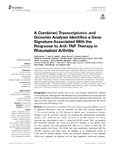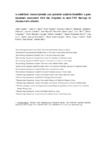Mostrar o rexistro simple do ítem
A combined transcriptomic and genomic analysis identifies a gene signature associated with the response to anti-TNF therapy in rheumatoid arthritis
| dc.contributor.author | Aterido, Adriá | |
| dc.contributor.author | Cañete, Juan D. | |
| dc.contributor.author | Tornero, Jesús | |
| dc.contributor.author | Blanco García, Francisco J | |
| dc.contributor.author | Fernández-Gutiérrez, Benjamín | |
| dc.contributor.author | Pérez, Carolina | |
| dc.contributor.author | Alperi-López, Mercedes | |
| dc.contributor.author | Olivé, Alex | |
| dc.contributor.author | Corominas, Héctor | |
| dc.contributor.author | Martínez-Taboada, Víctor | |
| dc.contributor.author | González, Isidoro | |
| dc.contributor.author | Fernández-Nebro, Antonio | |
| dc.contributor.author | Erra, Alba | |
| dc.contributor.author | López Lasanta, María | |
| dc.contributor.author | López-Corbeto, Mireia | |
| dc.contributor.author | Palau, Núria | |
| dc.contributor.author | Juliá, Antonio | |
| dc.contributor.author | Marsal, Sara | |
| dc.date.accessioned | 2020-03-11T11:38:40Z | |
| dc.date.available | 2020-03-11T11:38:40Z | |
| dc.date.issued | 2019-07-02 | |
| dc.identifier.citation | Aterido A, Cañete JD, Tornero J, Blanco F, Fernández-Gutiérrez B, Pérez C, et al. A combined transcriptomic and genomic analysis identifies a gene signature associated with the response to anti-TNF therapy in rheumatoid arthritis. Front Immunol. 2019;10 | es_ES |
| dc.identifier.issn | 1664-3224 | |
| dc.identifier.uri | http://hdl.handle.net/2183/25159 | |
| dc.description.abstract | [Abstract] Background: Rheumatoid arthritis (RA) is the most frequent autoimmune disease involving the joints. Although anti-TNF therapies have proven effective in the management of RA, approximately one third of patients do not show a significant clinical response. The objective of this study was to identify new genetic variation associated with the clinical response to anti-TNF therapy in RA. Methods: We performed a sequential multi-omic analysis integrating different sources of molecular information. First, we extracted the RNA from synovial biopsies of 11 RA patients starting anti-TNF therapy to identify gene coexpression modules (GCMs) in the RA synovium. Second, we analyzed the transcriptomic association between each GCM and the clinical response to anti-TNF therapy. The clinical response was determined at week 14 using the EULAR criteria. Third, we analyzed the association between the GCMs and anti-TNF response at the genetic level. For this objective, we used genome-wide data from a cohort of 348 anti-TNF treated patients from Spain. The GCMs that were significantly associated with the anti-TNF response were then tested for validation in an independent cohort of 2,706 anti-TNF treated patients. Finally, the functional implication of the validated GCMs was evaluated via pathway and cell type epigenetic enrichment analyses. Results: A total of 149 GCMs were identified in the RA synovium. From these, 13 GCMs were found to be significantly associated with anti-TNF response (P < 0.05). At the genetic level, we detected two of the 13 GCMs to be significantly associated with the response to adalimumab (P = 0.0015) and infliximab (P = 0.021) in the Spain cohort. Using the independent cohort of RA patients, we replicated the association of the GCM associated with the response to adalimumab (P = 0.0019). The validated module was found to be significantly enriched for genes involved in the nucleotide metabolism (P = 2.41e-5) and epigenetic marks from immune cells, including CD4+ regulatory T cells (P = 0.041). Conclusions: These findings show the existence of a drug-specific genetic basis for anti-TNF response, thereby supporting treatment stratification in the search for response biomarkers in RA. | es_ES |
| dc.description.sponsorship | Ministerio de Economía y Competitividad (España); PSE-010000-2006-6 and IPT-010000-2010-36 | es_ES |
| dc.description.sponsorship | Generalitat de Catalunya; AGAUR, FI-DGR 2016 | es_ES |
| dc.language.iso | eng | es_ES |
| dc.publisher | Frontiers | es_ES |
| dc.relation.uri | https://doi.org/10.3389/fimmu.2019.01459 | es_ES |
| dc.rights | Atribución 3.0 España | es_ES |
| dc.rights.uri | http://creativecommons.org/licenses/by/3.0/es/ | * |
| dc.subject | Rheumatoid arthritis | es_ES |
| dc.subject | Genomics | es_ES |
| dc.subject | Transcriptomics | es_ES |
| dc.subject | Multi-omics association analysis | es_ES |
| dc.subject | Anti-TNF therapy | es_ES |
| dc.title | A combined transcriptomic and genomic analysis identifies a gene signature associated with the response to anti-TNF therapy in rheumatoid arthritis | es_ES |
| dc.type | journal article | es_ES |
| dc.rights.accessRights | open access | es_ES |
| UDC.journalTitle | Frontiers in Immunology | es_ES |
| UDC.volume | 10 | es_ES |
| UDC.coleccion | Investigación | es_ES |
| UDC.departamento | Fisioterapia, Medicina e Ciencias Biomédicas | es_ES |
| UDC.grupoInv | Reumatoloxía (INIBIC) | es_ES |
| UDC.grupoInv | Grupo de Investigación en Reumatoloxía e Saúde (GIR-S) | es_ES |
| UDC.institutoCentro | INIBIC - Instituto de Investigacións Biomédicas de A Coruña | es_ES |
Ficheiros no ítem
Este ítem aparece na(s) seguinte(s) colección(s)
-
Investigación (FCS) [1293]







